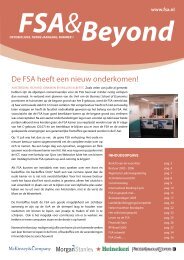You also want an ePaper? Increase the reach of your titles
YUMPU automatically turns print PDFs into web optimized ePapers that Google loves.
y Hans Moerman<br />
FIGUre 3 Multiple of ebITDa<br />
12.0<br />
10.0<br />
8.0<br />
6.0<br />
4.0<br />
2.0<br />
0<br />
7.1 7.0<br />
4.4 4.3<br />
2.7 2.7<br />
Source: Goldman Sachs<br />
6.7<br />
4.2<br />
2.5<br />
7.4<br />
4.6<br />
2.8<br />
2001 2002 2003 2004 2005 2006 2007 2008 2009 2010 2011 [H1]<br />
Combining the large amount of funds<br />
available at the private equity firms<br />
with the cash need of potential portfolio<br />
companies one would expect a<br />
pretty vibrant market at the moment.<br />
However, in the Dutch private equity<br />
market (mid market LBO’s) we witness<br />
a very special situation. Despite the<br />
large amount of capital that is committed<br />
to the funds and has not yet been<br />
used (the dry powder) the activity at<br />
the moment is very limited. Moreover<br />
we find that many sale processes fail<br />
recently, even private equity firms with<br />
lots of dry powder choose to keep the<br />
ammunition for the times coming. But<br />
at the same time we see that the average<br />
pricing is fairly constant (fiGURE 3).<br />
Investors are still betting the bank, but<br />
only on strong companies. This behavior<br />
is in line with evidence from the<br />
past from all kinds of markets. In upturns<br />
one can sell any type of assets, be<br />
it distressed government debt, a house<br />
in a bad neighborhood or any company<br />
for that matter. In times of crisis investors<br />
flee only to the most high quality<br />
assets, liquidity discounts for smaller<br />
countries are huge, one can now only<br />
expect to sell a house on a prime location<br />
and processes with non perfect<br />
companies are bound to fail.<br />
Going forward we expect a very interesting<br />
strategic game in the private equity<br />
industry. Companies have to come<br />
8.2<br />
5.3<br />
2.9<br />
8.7<br />
4.6<br />
3.1<br />
9.6 9.6<br />
6.3<br />
3.3<br />
5.2<br />
4.4<br />
8.9 9.2<br />
4.1<br />
4.8<br />
4.4<br />
4.8<br />
to the investors, with the banks out of<br />
the picture and capital markets closed<br />
they have no place to go. Investors have<br />
large amounts of money at their disposal<br />
and cannot wait forever to invest it.<br />
At one point in time the firms will have<br />
to decide between investing in less than<br />
perfect companies versus returning the<br />
committed money to the investors in<br />
the private equity firm.<br />
All private equity that have raised funds<br />
in the recent years face these difficult<br />
decisions in 2012 and 2013 and it is<br />
likely that there will be a shake out of<br />
the weaker firms<br />
But the stronger firms, able to make<br />
high quality investment decisions and<br />
good governance, will prevail and come<br />
stronger out of this period. We believe<br />
that the strength of the fund will be<br />
determined by the adaptability. Leverage<br />
and multiple play are no longer instruments<br />
at the disposal of the private<br />
equity companies and all of us have to<br />
redefine our strategy and the way we<br />
make money. Sales growth and margin<br />
improvement will be the driving forces<br />
for private equity in the future. Private<br />
equity companies will work actively<br />
with their portfolio companies to define<br />
a strategy to gain market share from<br />
their competitors by improving their<br />
proposition to the client or to increase<br />
margins by concentrating on operational<br />
excellence programs.<br />
8.8<br />
4.4<br />
4.4<br />
Debt<br />
Equity<br />
73<br />
After years of “live now pay later” now<br />
is the time for the Western economies<br />
to pay. The Netherlands are not exempt<br />
and we even expect that the Dutch will<br />
have to pay more than their neighbors.<br />
In the coming period where the banks<br />
and the capital markets will be closed<br />
there is one place left to go for companies<br />
in need of cash: the private equity<br />
firms. These firms will have to change<br />
their strategy to adapt to the new needs<br />
of the economic environment. There<br />
will be no place for old fashioned locusts<br />
in the new markets. There is light,<br />
and we believe a bright light, at the end<br />
of the tunnel for private equity firms<br />
that live in a strong symbiosis with their<br />
portfolio companies.<br />
Hans Moerman is associate at<br />
NpM capital<br />
403











